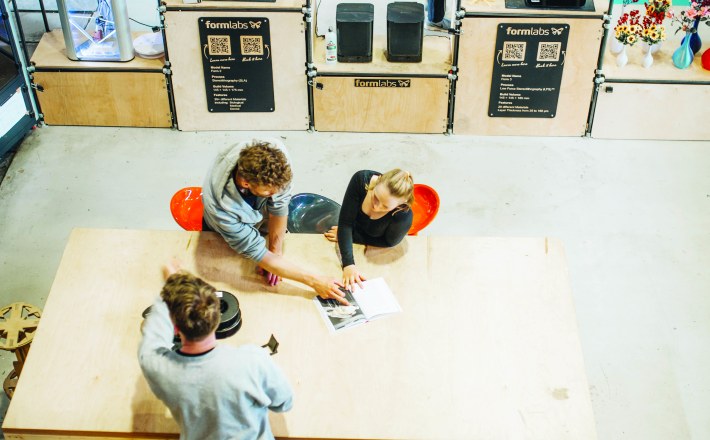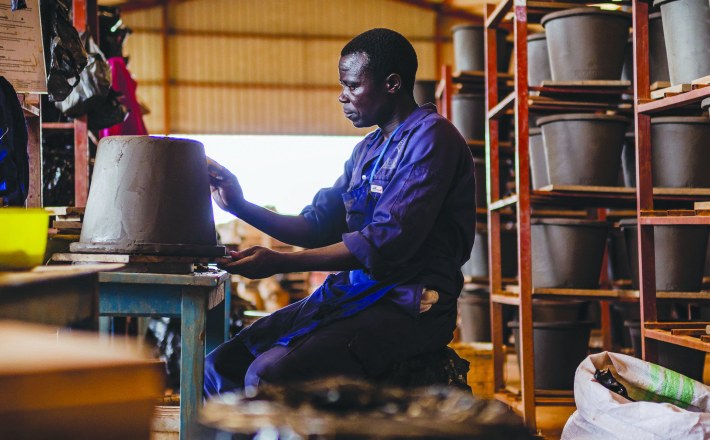Cupcake Couture
Companion caught up with the flamboyant Italian baker, Melissa Forti, as she prepares to throw open the doors of Café Duse at the new 25hours Hotel Indre By, Copenhagen
From humble beginnings as a self-taught baker to creating afternoon tea in the Royal Academy Café in London, publishing two international best-selling cookbooks and teaming up with 25hours Hotels to create Café Duse in Copenhagen, Melissa Forti’s journey through the baking world hasn’t followed a traditional route. But then nothing about her follows convention. Her personal style is more tattoos and high fashion than aprons and wooden spoons. She respects yet rejects French baking in favour of an English-meets-Italian philosophy, and constantly pays homage to the cookbooks of old. Born in Rome, she now lives in Sarzana in the Italian region of Liguria, from where she explains her glamorous baking journey.
How did your love of baking begin?
I always said I would never bake in my life! I used to enjoy cooking at home very much. I had the luxury of taking a sabbatical year. At the time, I didn’t know what I wanted to become or where I was going with my life, so I listened to all the signs the cosmos were sending me. I travelled a lot and found myself in the United States in front of a cake decorating shop. It was an impressive five floors of colours and sugar and glitter and I thought wow! I wasn’t into baking but I bought some things because I’d spent an hour in there!
When I got back to Italy on a rainy Sunday afternoon in 2007 I baked my first cup cakes which were disgusting! So I baked them again and my boyfriend said these are actually really good. We had a friend who had a restaurant and I took them to him to offer to his guests and he called me after an hour to say ̓can you bring them every week̓ as his customers loved them. No one was talking about cupcakes in Italy at the time.
My baking started for fun and most of my baking skills come from self-taught studies. I started posting pictures of my cakes on Facebook from my pretty, plant-filled terrace. At the time no one was doing this and I started to get lots of online orders.
I moved to England and I started to study baking. I did some courses with Peggy Porschen and then I went to the United States to learn the trade. Back in Sarzana, I opened my first shop. It was very tiny but I had to hire five people within six months of it opening to keep up with the demand. I ended up opening Melissa’s Tea Room and Cakes, a boutique bakery and tearoom in Sarzana which sadly I had to close recently due to other commitments and Covid, of course.
What is your style of baking?
I’m a very traditional baker with a modern twist. I’m not into French baking or modern baking. No disrespect but it’s just a style choice. I search for vintage cookbooks from Australia to France to Germany in which I find old recipes. I like to go back in time and see how things have been designed through history and before pastry chefs.
For example, our beloved Italian panettone was not what it is today. Originally it was flat and quite dense—not at all fluffy as it is now. I’m interested in going back in time to see the evolution of items that I bake whilst keeping an eye on a modern twist, although I’m quite faithful to the original. I would say my baking is very traditional, international and local at the same time!
What are your favourite bakes at the moment?
I’m very traditional. Simple things are the best but not necessarily the easiest to prepare. If it’s simple you have to make it spot on. I’m very much into lemon. I love all the citruses, oranges and lime. I love everything that’s fresh. And I adore raspberries with lemon. These are very traditional but timeless flavours. And, of course, chocolate. WhiIst I could eat chocolate every so often, I could eat lemon every day. I also love ricotta cheese. I put it in many of my cakes as it provides amazing texture and flavour.
Is Café Duse your first café collaboration?
Yes, it's my first partnership. I’ve been trying to work with 25hours for many years, as I feel a strong connection to the brand. I love the fact that they are growing and evolving, and are very curious, open, modern, friendly and informal. Although my style is more traditional in a sense, they have what I am missing, and I have what they are missing! So it’s a good match.
How did you decide on Copenhagen for your café?
We talked about Cologne or Dubai, but none of the buildings really felt right until Copenhagen came along and they showed me the building and I was like, ok that’s me! That’s the place! And we totally agreed that’s where Café Duse was meant to be.
The hotel is in a former university and the café space is gorgeous. England is a big part of my life as I lived there for 10 years, and this building has a lot of England in it. The look of it reminds me of Buckingham Palace with big windows and a grand main entrance. It’s stylish but also historic. And we discovered that in the exact place we chose for Café Duse, there was a café at the beginning of the 20th century. It feels like destiny.
How did you come up with the name Café Duse?
I wanted to call this place Café Duse after the Italian actress Eleonora Duse who was born in 1858. She was an Italian woman doing business abroad – just like me. She was one of the very first feminists in the theatre business. It’s remarkable to acknowledge that this woman worked in strong synergy with other women which at the time was rare. She also changed the face of theatre, being one of the first actresses to cry on stage. The way we see the theatre nowadays is thanks to her. She’s very well known in Denmark. All in all, it was a great opportunity to pay tribute to this amazing woman with a decadent cafe that would awaken all the senses.
Will you have a signature cake at Café Duse?
25hours is a German company and my most famous cake in Germany is the tiramisu layer cake. Two-star Michelin celebrity chef Tim Raue came to my shop here in Italy and had to bake my tiramisu cake for a TV show without knowing the recipe. And he failed miserably! From that moment it became huge. My red velvet and my cannoli cake are also very popular.
I also love tarts made the Italian way—with a sugar based pastry dough called frolla—called Crostata. The specifications for this dough are countless. It’s enough to add or remove one ingredient and the whole texture changes. And usually we fill them up with jam or custard or chocolate cream, so they are very versatile and I love them. I will bake plenty of them at Café Duse in a homemade style.
Will the café have an Italian sensibility?
We will have Italian products that aren’t known in Denmark, so that will be a novelty. And we will introduce a new way of buying cakes. Danes usually go to bakeries to have those amazing pastries to enjoy with coffee in the morning. They are used to having little tarts or beignets. I’ve heard that when they go for dinner at a friend’s house they usually bring chocolates or wine. In Italy we bring a tray of cakes or little mignonne. We will have cakes to take away and for special occasions, which is something new for Copenhagen.
I have designed an afternoon tea for Café Duse which is Italian influenced but also English. We will have scones but also have little Italian pastries. It will be a tribute to both countries in Copenhagen.
I’m a lifestyle enthusiast. I’m Italian, so I do enjoy an aperitivo. I'm very serious about chilling and relaxing. When you work you work, you give a hundred per cent, but when it’s time to stop, then it’s family and friends. And that’s how life should be. Café Duse is all about this. I can’t wait for everyone to come in and eat cake.
Melissa is working on her third baking book now and promises that Café Duse will be featured. Previous books include The Italian Baker (2016) and Melissa Forti Christmas Baking Book (2020).

Melissa Forti’s Raspberry Streusel Loaf Cake
This recipe can be used as a base for more variations. You can swap raspberries for blueberries or blackberries, or even apples if you want. I remember having a slice of this loaf in a café near Hollywood Boulevard in Los Angeles very often for breakfast with a cup of coffee. Few things work magically like raspberries! They really are one of my favourite little fruits. Be sure you bake it for a Sunday morning breakfast or for a picnic in the park and your family and friends will thank you!
INGREDIENTS
The Streusel (crumbly topping)
- 75g – ½ cup – 3 oz. of flour
- 6 tbsp. of white sugar
- 115g – ½ cup – 4 oz. of cold butter diced
The Loaf
- 340g – 2 ¼ cups -12 oz. of flour sifted
- 2-½ tsp. of baking powder
- 250g – 1 ¼ cup – 9 oz. of white sugar
- the zest of lemon grated
- 170g – ¾ cup – 6 oz. butter room temperature
- 1 tsp. vanilla extract
- 3 eggs
- 175g – ¾ cup – 6 oz. sour cream
- 250g – 2 cups – 8.8 oz. of fresh raspberries
METHOD
- Preheat oven to 180°C (350°F). Butter and flour a 9-inch loaf pan.
- Prepare the crumble. In a bowl combine the flour, sugar and cold butter and rub mixture using your fingers until it resembles fine breadcrumbs. You can also use a food processor to accelerate the process. Set aside.
- Sift flour and baking powder in a bowl and combine. In the bowl of a stand mixer put sugar, lemon zest and beat on low speed. Add the butter and vanilla paste and continue beating.
- When the mixture becomes light and fluffy, start adding the eggs one at a time followed by the sour cream. When thoroughly combined, add the flour and baking powder in three additions.
- Finally, fold in half of the fresh raspberries using a spatula and making sure not to break them.
- Pour batter into the loaf pan and spread the other half of the raspberries over, pressing them a little into the batter.
- Scatter the crumble over the batter and bake for about 40-45 minutes.
- Once baked, allow to cool for 15 minutes before removing it from the pan. Leave to cool on a wire rack.
Melissa's Top Five Vintage Cookbooks
- L'arte di mangiare beneby Pellegrino Artusi (1891)
- Mrs Beeton's Book of Household Management by Isabelle Beeton (1861)
- English bread and Yeast Cookeryby Elisabeth David (1977)
- Royal Bakers Bookby Ch. Herman Senn (1902)
- Seventy-Five Receipts for Pastry, Cakes & Sweetmeatsby Eliza Leslie (1828)
The Artusi is a timeless cookery book. In Italy it’s the bible of not just baking but everything from starters to cakes. Julia Child taught America how to cook. Pellagrino Artusi taught Italians how to cook.
Melissa Forti





